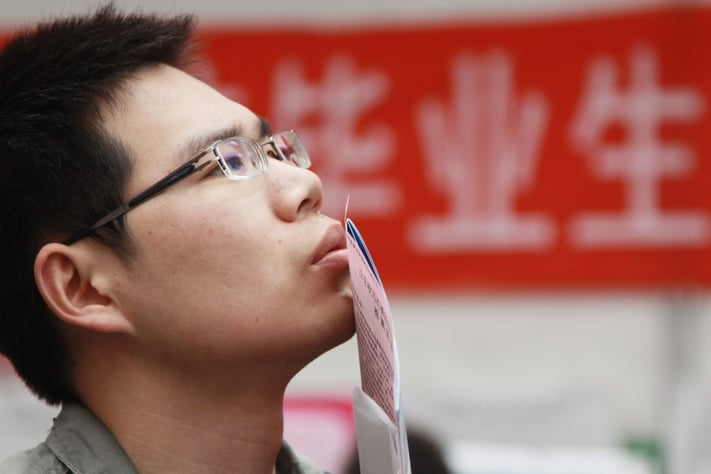
Experience tells us that parents look at university rankings. Rankings can provide some useful insights when researching and building a university application list - but often times they simply serve to confuse parents and students at a time when they are looking for clarity.
UWCSEA's team of experienced University Advisors explain how rankings work and which measures to look at more closely when High School students and parents start their search for a university.
Don’t get us wrong, rankings can have value. They certainly have tremendous value for the university - they help to build the university's brand and prestige, they help to increase the number of applications, they help to generate publicity for their research and programmes, they can be useful in attracting top quality staff, they appeal to donors - and, when they are reporting the right measures, they can be a helpful for prospective students when planning their university applications.
The questions we are asked as a result of our work over many years with parents and students in international schools around the world (not just in Singapore) have prompted us to collate some advice on how best to make use of rankings.
All is not as it seems, as we explain below.

Go beyond the rankings to find a university that is a ‘fit’ for the student - academically, socially, and in other ways.
Point 1: It all starts with the individual
This is the most important factor by far to keep in mind. As with all facets of university planning, it all starts with the student and what will best suit their individual situation and needs. There is no direct way to measure or compare the quality of a university experience for your child - how much they will learn, grow or get inspired at one institution over another. Many parents turn to university rankings to try to discern differences among their child’s choices, but such rankings rely on proxies for quality which can be arbitrary or tangential to a student’s experience.
While rankings can certainly be a place to start the university research process, it is important for students and parents to go beyond the rankings to find a university that is a ‘fit’ for the student - academically, socially, and in other ways.
Many parents have heard that University Advisors tend to suggest that they disregard the rankings. Our recommendation is that they can be a useful piece of information, if applied in context, but we urge families not to overly rely on rankings because they are incomplete at best, and can be a highly subjective and potentially misleading source of information.

In many instances, ranking statistics are not focused on the undergraduate experience and are based on factors that would mean very little to the experience of students embarking on their first university degree.
Point 2: Consider the source
It is uncommon to find a rankings statistic that focuses on the undergraduate experience. In fact, they are largely based on factors that would mean very little to the experience of students embarking on their first university degree.
Many organizations that offer university rankings are for-profit entities that are more concerned with selling magazines than with journalistic integrity. It could be argued that the business objectives of the publisher - including maintaining their relationships with advertisers and their (sometimes dwindling) readership - are the primary driver in producing these rankings. The more 'sensational' the statistics, the better the read.
In the United States, US News & World Report (USNWR) competes with Forbes and the just recently introduced Wall Street Journal/TES ranking to dominate the US “market” for rankings. QS World Rankings and THE compete around world rankings, but these two rankings diverge significantly due to differences in the indicators used and the weightings applied when calculating overall scores.
The best approach is to look at several sources for rankings and regard each with a critical eye.

Overall rankings typically end up being the average of many factors - some of which could actually be a negative factor when assessing the university’s ‘fit’.
Point 3: Look at the criteria the each ranking utilizes (and pay attention to the criteria that are omitted)
When looking at the rankings, students and parents must do their research and find out what the criteria are that each ranking is using before deciding if they plan to place value on that ranking.
For example, USNWR uses the following as highly weighted criteria in calculating the overall ranking for a university:
- how many students are denied admission
- what is the ‘reputation’ of a university (as determined by presidents, provosts and deans)
- faculty resources (commitment to instruction)
- alumni giving
While it may be important to a student or parent that faculty have the resources they need to educate their students, are alumni giving and the ‘deny rate’ of a university important to a student’s experience and ‘fit’ at a university? Our opinion is no, and so we encourage our students to look at criteria that are important for them.
Forbes created their own ranking nine years ago, with a focus on the Return on Investment (ROI) of a university education in the US, as opposed to a focus on the criteria for gaining entry to a university (something they felt USNWR placed too much emphasis upon). Their criteria include things like
- student debt (25%)
- student satisfaction, as determined by students’ reporting on ratemyprofessor.com (25%)
While student debt may not be a factor in making university decisions for all of our families, student satisfaction certainly is important.
The QS World Rankings use ‘Citations per Faculty’ as a major criteria, with the goal of measuring how often a professor publishes, but it is widely known that the sciences publish much more frequently than the social sciences, so a university that is strong in the social sciences will always be at a disadvantage. Another example of this can be found in the Shanghai Ranking, that weights Nobel Prize winners and the number of articles published in Nature and Sciences journals as a major criteria. As university advisors, we would argue these are not important criteria for a student to use when making a decision on a good ‘fit’ for university and thus, perhaps these rankings should not be used as an influential piece of information in the university research process.
A new ranking released this year, called the Wall Street Journal/Times Higher Education ranking of U.S. colleges, uses the following major criteria for calculating its rankings:
- student outcomes
- university resources
- diversity of the student body
While the usual suspects still remain in the top of the list, places like Washington University of St Louis and Emory University are ranked more highly than some in the Ivy League. This suggests that students have excellent futures beyond their university and that a diverse student body is valued and present on the campus.
For students at UWCSEA (and indeed, at many international schools), a university with a diverse student body and the resources to pursue employment or graduate school upon graduation can be highly valued. Thus we encourage our students look at these rankings, rather than those that measures how many students are denied entry.

For students in truly international schools, a university with a diverse student body and the resources to pursue employment or graduate school upon graduation is highly valued.
Students looking to the UK often use the league tables published in The Guardian. Major components of this ranking include:
- student satisfaction
- student entry requirements
- graduate prospects
- research quality
We often advise our student to sort these tables by the ‘student satisfaction’ measure, because the entry standards for a university will not affect them once they are there, but the student satisfaction certainly will be important to their overall happiness at a university.
In Australia, the University of Melbourne and Australian National University (ANU) in Canberra are both ranked as number one in Australia, depending on the ranking being quoted. However the experience of going to each is vastly different: the University of Melbourne is strongest in pre-clinical sciences while ANU is strongest in arts and humanities.
We strongly recommend that you avoid relying on overall rankings as these can end up being the average of many factors - some of which are at best not relevant and in others instances would actually be a negative factor when assessing the university’s ‘fit’ for your child.

The amount of money spent on research is not a proxy for the quality of research done or an indicator of opportunities to participate in research as an undergraduate student, which are often greater at smaller colleges.
Point 4: Compare Apples to Apples
When using rankings, make sure you are comparing universities in a similar category. For example, a small, liberal arts college cannot be compared with a large research university.
QS World Rankings place 20% of their ranking on research citations per faculty member, which virtually eliminates liberal arts colleges and small universities in Europe because those institutions do not share the same budgets as large private research universities and many public universities.
The amount of money spent on research is not a proxy for the quality of research done or an indicator of opportunities to participate in research as an undergraduate student, which are often greater at smaller colleges. Observation suggests that colleges which have smaller research budgets often place a greater focus on teaching undergraduates which can mean your child’s experience there would be better.
The bottom line is that the more research dollars a university has, the less likely they are to have their teachers spend time on teaching undergraduates.

By using online rankings, you are often able to filter results based on criteria that matter most to you - which may mean a very different set of institutions come out on top!
Point 5: Make the rankings work for you
Look at rankings online rather than in print. Rankings published in magazines are often based on data that was collected a long time ago. Importantly, they can’t be filtered to focus on criteria important to you.
Many online rankings will allow you to sort by the criteria that matter most to you. For example, if cost or employment prospects are most important to you it is possible to isolate that one factor and see the ranking of just that factor. This allows you to glean information that is most relevant for your personal decision-making process.

Be aware that many universities do not 'qualify' to be ranked by the rankings systems as they may not be able to provide data on some specific 'ranking measures' - despite offering excellent opportunities for their students.
Point 6: Don’t assume that because a university isn’t highly ranked, it isn’t good
The worldwide rankings only account for roughly 5% of universities, meaning there are hundreds or thousands of universities that are unranked. This does not mean they aren’t excellent educational institutions. This shortcoming is evidenced by the fact that USNWR will not rank universities who do not require an SAT or ACT as part of the admission process. Because of the trend among US colleges, led by New York University, to make standardized testing optional or flexible, the place of test-optional colleges are skewed in this popular ranking system. (If you have had no exposure to the US system and are wondering what these are, they are American university admissions tests that are used by many, but not all, universities in the US and by US-linked universities in other countries).
Many students and parents applaud universities that have a holistic process and look beyond test scores, but it is important to know that by making that innovative step, these universities have ‘sacrificed’ their opportunity to participate in the ranking process and will not receive a ranking.
A new university, such as Yale-NUS in Singapore, will not be ranked highly within a ranking system that measures alumni giving or graduate outcomes, because they do not have any yet (their first class graduates this year). However, the opportunities and experiences that students have had at that university have been fantastic.

Success beyond university requires initiative on the part of a student and a proactive approach to finding opportunities.
Point 7: Don’t assume a direct correlation between name recognition and job placement or entry to competitive graduate programmes
We feel it is critical for students and families to understand that attending a university with a ‘big’ name does not guarantee ‘big results’ upon graduation. Again and again we hear stories from our alumni of the importance of being able to stand out in their university (the big fish in the small pond) and the importance of establishing relationships with professors, internship supervisors, etc.
Success beyond universities requires initiative on the part of a student and a proactive approach to finding opportunities. Liberal arts colleges or honors programmes in large universities can provide students with ample opportunities to make connections with professors, take advantage of career services, find internships, and many other things that can lead to success later on.
As University Advisors our goal is to match students with universities where they will be appropriately challenged, emotionally healthy and have opportunities to thrive. Rankings can be a useful tool for beginning to learn about a university, but we caution students and their families against placing too much value on rankings and the ‘reputation’ that these rankings (supposedly) confer. Rankings cannot tell you whether your child will find a subject he is passionate about, get along with his roommate, stay engaged in his learning or connect with a professor. It is important that research moves beyond the rankings to keep student experience and ‘fit’ at forefront of every decision.
More information
The following links provide further insight into critically reviewing rankings:
The Order of Things: What College Rankings Really Tell Us by Malcolm Gladwell in The New Yorker
Why College Rankings Are a Joke by Frank Bruni in The New York Times
How to Make Sense of College Rankings by Frank Bruni in The New York Times
Fiske Guide to Colleges 2017 - a critic’s ratings, rather than rankings





